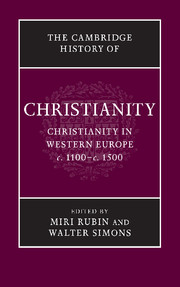Book contents
- Frontmatter
- Introduction
- PART I INSTITUTIONS AND CHANGE: 1100–1200
- PART II FORGING A CHRISTIAN WORLD, 1200–1300
- 5 The theological framework
- 6 The legal underpinnings
- 7 Material support I: parishes
- 8 Material support II: religious orders
- 9 The Word and its diffusion
- PART III THE ERECTION OF BOUNDARIES
- PART IV SHAPES OF A CHRISTIAN WORLD
- PART V CHRISTIAN LIFE IN MOVEMENT
- PART VI THE CHALLENGES TO A CHRISTIAN SOCIETY
- PART VII REFORM AND RENEWAL
- Select bibliography
- Index
- Map 1 Western Europe c. 1100 – c. 1500
- Map 2 Universities of Europe
- References
5 - The theological framework
from PART II - FORGING A CHRISTIAN WORLD, 1200–1300
Published online by Cambridge University Press: 28 March 2010
- Frontmatter
- Introduction
- PART I INSTITUTIONS AND CHANGE: 1100–1200
- PART II FORGING A CHRISTIAN WORLD, 1200–1300
- 5 The theological framework
- 6 The legal underpinnings
- 7 Material support I: parishes
- 8 Material support II: religious orders
- 9 The Word and its diffusion
- PART III THE ERECTION OF BOUNDARIES
- PART IV SHAPES OF A CHRISTIAN WORLD
- PART V CHRISTIAN LIFE IN MOVEMENT
- PART VI THE CHALLENGES TO A CHRISTIAN SOCIETY
- PART VII REFORM AND RENEWAL
- Select bibliography
- Index
- Map 1 Western Europe c. 1100 – c. 1500
- Map 2 Universities of Europe
- References
Summary
The thirteenth century was one of the most theologically vibrant periods in the history of the Christian church. It was in this period that the subject matter of theology (usually called by contemporaries sacra doctrina or sacra pagina) was more closely defined, and that theology became a subject for study in educational institutions. Yet the ideas that made up the doctrines of theology were, for the most part, static. How could they, indeed, be anything else? Christian doctrine was largely worked out and agreed upon by the Councils and theologians of the early-church (‘patristic’) period in the fourth and fifth centuries, which, even as they defined the canon of Scripture, drew out of it the statements of faith that made up the creeds and the fundamentals of sacramental life. The basic structure of creation, sin, incarnation, grace, redemption, Trinity, sacrament and eschaton was in place long before the thirteenth century, and essential change was neither possible nor desirable to a belief system steeped in the concept of the authority of the past.
In this deepest sense of fundamental doctrine, then, the theological framework of the thirteenth-century church was, and could be, no different from that of its predecessors. What changed, however, and what justifies the thirteenth century’s claim to reverberate in Christian theological history, was a double evolution: firstly, a refinement of what it meant to study theology; alongside, secondly, an opening up of the arena in which theological thinking might have some practical effect, with a broadening of the recipient constituency for its pronouncements.
Keywords
- Type
- Chapter
- Information
- The Cambridge History of Christianity , pp. 73 - 88Publisher: Cambridge University PressPrint publication year: 2009

